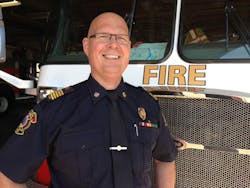Karpluk: Should Fire Service Leaders be Idealists?
Years ago someone told me that I was an idealist. Rightly or wrongly, this bothered me for some time as I interpreted this to mean that I did not look at things realistically and that I was dreaming things that could not possibly happen.
Believe it or not, for several years following that statement, I disliked the sound of the word and reframed my thinking process. I refocused my thinking to look for ways to find weaknesses in ideas and projects. I thought I was being a realistic thinker and then one day it was pointed out to me that I was becoming a critical leader. I’m not sure how to phrase this in a polite Canadian way, but I looked back at some of my thinking and realized that my thinking process sucked in many ways.
After a careful and lengthy personal reflection, and a quick review of several idealist definitions, I discovered that those who are idealistic possess four key attributes:
- They are highly ethical, professional and live by high moral values,
- An attitude that believes it is possible to live with high standards of honesty and trust,
- A strong belief that people can reach their full potential, and
- An attitude that problems can be solved no matter how challenging the situation.
Today, I have labeled myself as an idealist and I will wear this as a badge of honour. Author and motivational speaker Jim Rohn (1985) stated, “Dreams are projections of the life we wish to lead. Therefore, when we allow them to “pull” us, our dreams unleash a creative force that can overpower all obstacles hindering the attainment of our objectives.”
I deeply admire former South African President Nelson Mandela for his passion and dream to free his country from apartheid. While serving 27 years in prison he dreamed of a better South Africa. Would he be considered an idealist? Absolutely, unequivocally, yes.
There is no doubt that fire service leadership is about being an idealist. Here’s why.
- Fire service leaders are expected to be ethical, professional and demonstrate on a daily basis a strong set of moral values. Right is right even if nobody is doing it, and wrong is wrong even if everybody is doing it.
- All successful fire service leaders have a fervent attitude that honesty and trust are essential ingredients in leadership. These leaders view honesty and trust as the sacred cow that cannot be questioned, and it if is, it’s treated as sacrilege.
- Without believing in your people, without expecting your people to excel and reach their potential, you will never succeed as a leader. It doesn’t matter if you are in a volunteer or career department, union or nonunion, the fact remains that leaders must believe in their people. Yes, there are times when people let leaders down. There are days when certain individuals have a unique way of pressing all of the right buttons and testing the patience of the department leadership, but as author Chris Widener (2011) stated in his book, Leadership Rules, “You get what you expect.” Pretty simple perspective-successful leaders “expect” and help their people excel to their full potential.
- Solving problems is a daily occurrence in the fire service. From an operational perspective solving problems at incidents is what we do. It’s what we train for - it’s what gives us that adrenaline rush and sense of duty. The same can be said for leaders solving administrative problems. If you don’t think fighting for the budget dollars, proactively planning training programs and creating new and innovative ways for officer development is solving problems, then please e-mail me ([email protected]) and give me your thoughts.
What does this mean for our profession? Effective fire service leadership today is dependent upon being an idealist. This doesn’t mean we should jump into projects without weighing the pros and cons, anticipating challenges and proactively laying down the groundwork for Plan B if Plan A doesn’t succeed. What it does mean is that fire service leaders today are expected to make a difference in not only their departments, but also their profession.
It’s ok to be an idealist today. Without being an idealist we will not achieve the success we want as leaders.
Let’s grow together.
